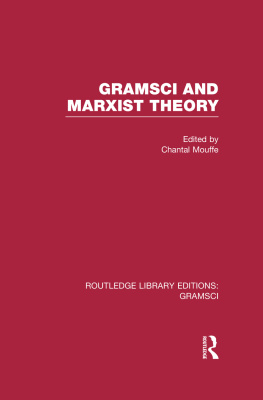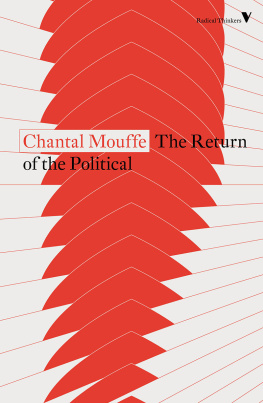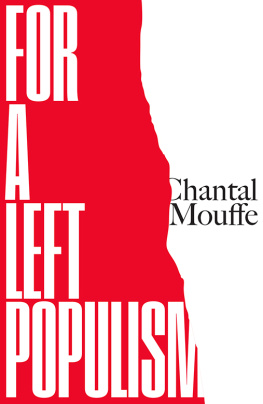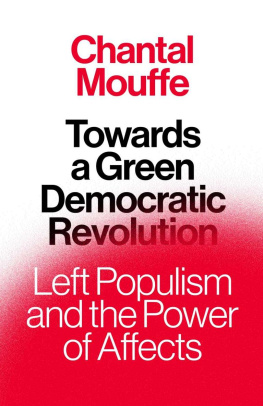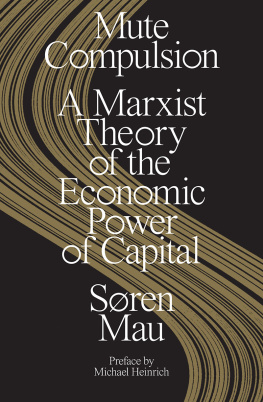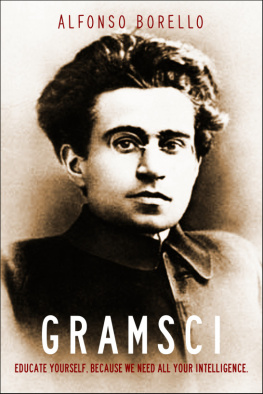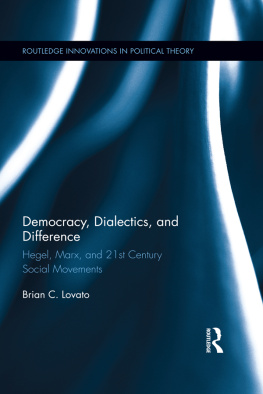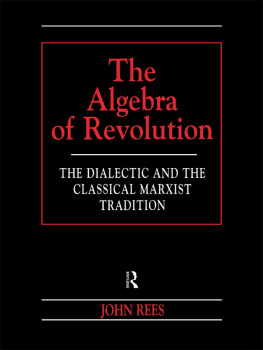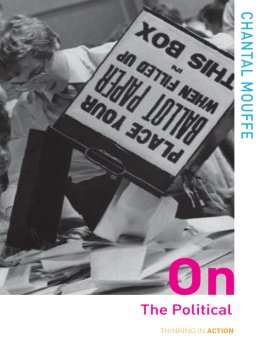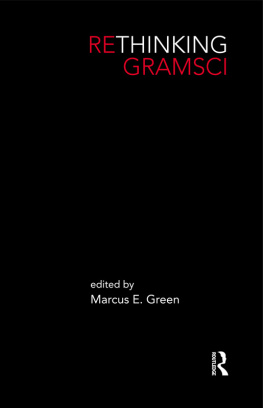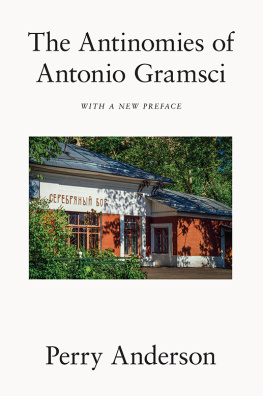ROUTLEDGE LIBRARY EDITIONS: GRAMSCI
Volume 3
GRAMSCI AND MARXIST THEORY
GRAMSCI AND MARXIST THEORY
Edited by
CHANTAL MOUFFE
First published in 1979
This edition first published in 2014
by Routledge
2 Park Square, Milton Park, Abingdon, Oxon, OX14 4RN
and by Routledge
711 Third Avenue, New York, NY 10017
Routledge is an imprint of the Taylor & Francis Group, an informa business
1979 Chantal Mouffe
All rights reserved. No part of this book may be reprinted or reproduced or utilised in any form or by any electronic, mechanical, or other means, now known or hereafter invented, including photocopying and recording, or in any information storage or retrieval system, without permission in writing from the publishers.
Trademark notice: Product or corporate names may be trademarks or registered trademarks, and are used only for identification and explanation without intent to infringe.
British Library Cataloguing in Publication Data
A catalogue record for this book is available from the British Library
ISBN: 978-0-415-74361-7 (Set)
eISBN: 978-1-315-79439-8 (Set)
ISBN: 978-1-138-01541-8 (Volume 3)
eISBN: 978-1-315-79439-6 (Volume 3)
Publishers Note
The publisher has gone to great lengths to ensure the quality of this reprint but points out that some imperfections in the original copies may be apparent.
Disclaimer
The publisher has made every effort to trace copyright holders and would welcome correspondence from those they have been unable to trace.
Gramsci and Marxist Theory
Edited by
Chantal Mouffe
First published in 1979
by Routledge & Kegan Paul Ltd
39 Store Street, London WC1E 7DD,
Broadway House, Newtown Road,
Henley-on-Thames, Oxon RG9 1EN and 9 Park Street, Boston, Mass. 02108, USA
Set in Times by
Computacomp (UK) Ltd, Fort William, Scotland and printed in Great Britain by
Whitstable Litho Ltd, Whitstable, Kent
Chantal Mouffe 1979
No part of this book may be reproduced in any form without permission from the publisher, except for the quotation of brief passages in criticism
British Library Cataloguing in Publication Data
Gramsci and Marxist theory.
1. Gramsci, Antonio
I. Mouffe, Chantal
335.40924 HX288.G7 7940935
ISBN 0 7100 0357 9
ISBN 0 7100 0358 7 Pbk
Contents
Chantal Mouffe
Norberto Bobbio
Jacques Texier
Nicola Badaloni
Leonardo Paggi
Chantal Mouffe
Christine Buci-Glucksmann
Massimo Salvadori
Biagio de Giovanni
For kind permission to reprint several of the essays contained in this reader the editor and publishers wish to thank Editori Riuniti, Giangiacomo Feltrinelli Editore, Mondoperaio, Telos and Dialectiques. They also wish to thank Lawrence & Wishart, Publishers, London, for permission to quote from the following works by A. Gramsci: Selections from the Prison Notebooks (1971), edited and translated by Q. Hoare and G. Nowell Smith; Selections from Political Writings 192126 (1978), edited and translated by Q. Hoare; and Selections from Political Writings 191020 (1977), edited by Q. Hoare.
Chantal Mouffe
If the history of marxist theory during the 1960s can be characterised by the reign of althusserianism, then we have now, without a doubt, entered a new phase: that of gramscism. For some years now we have been witnessing an unprecedented development of interest in the work of Antonio Gramsci and the influence of his thought is already very extensive in several areas of marxist enquiry. This phenomenon, which has developed in the wake of the events of 1968 is certainly linked to a renewal of interest amongst intellectuals in the possibilities of revolutionary transformations in the countries of advanced capitalism. Following a period of pessimism which had caused intellectuals to turn to the countries of the Third World, seeing these as the weakest link in the imperialist chain and the natural starting point for the revolutionary process, there is now emerging some sort of consideration of the specific conditions in the West. More recently, the rise of eurocornmunism has played a very important role in the extension of this phenomenon, though we have to acknowledge that opinions are very divided on the legitimacy of attributing the theoretical paternity of this movement to Gramsci, as the debate currently taking place in Italy on hegemony and pluralism would suggest.
This divergence concerning the political significance of Gramscis work is by no means the first to arise. In fact, since his death in 1937, Gramsci has been subject to multiple and contradictory interpretations, ultimately linked to the political line of those who claimed or disclaimed him. So we have had the libertarian Gramsci, the stalinist Gramsci, the social democratic Gramsci, the togliattian Gramsci, the trotskyist Gramsci and so on. For an analysis of the way in which Gramsci has been taken up in direct relation to a political line the development represented by Palmiro Togliattis interpretation is very important: from Gramsci the national anti-fascist hero we move to Gramsci the leninist; an indication that the Gramsci question has never been dissociable from the strategy of the Italian Communist Party (PCI).1 This is still the case today, but an important new dimension was added by the quality of the debates on this question towards the end of the 1960s.
During the whole of the earlier period, in fact, the majority of interpretations of Gramsci presented him as a purely Italian figure whose influence was strictly national. The most advanced form of this in the PCI (Togliattis second version) involved the application of leninism to Italy. But the question of Gramscis contribution to marxist theory was never posed. This can be partly explained by the fact that the official philosophy of the PCI at that time historicism emphasised the importance of analysing a situation in its particularity and insisted upon the specific nature of the Italian situation. It was only when this historicism was confronted with a crisis in the 1960s with Italy moving into a new phase the high point of neo-capitalism that the analysis shifted from the particular in order to understand the more general characteristics of the capitalist mode of production. It was at this point that the scientific aspect of marxism became a central issue.
The critique of historicism, in which Galvano della Volpe played an early and important role with his Logica come scienza positiva in 1950, was central to the debate among Italian marxist philosophers during the 1960s. It was to result in a rejection of Gramscis thought since he was considered to be the historicist philosopher par excellence. We had to wait until the questioning of the official interpretation of Gramscis historicism developed by the PCI for the problem of Gramscis relation to marxist theory to be effectively approached in any objective way, and for his important contribution to be assessed. Since then different points of view have been put forward concerning Gramscis contribution to marxist theory and it is the aim of this reader to familiarise the English-speaking public with them. The debut for this new stage in Gramsci studies was the Cagliari Conference of 1967, for it was here that the new type of approach was expressed for the first time in the intervention by Norberto Bobbio, Gramsci and the conception of civil society.2



